Exploring Corporate Social Responsibility in Management Accounting
VerifiedAdded on 2023/06/12
|5
|1116
|499
Essay
AI Summary
This essay provides an overview of Corporate Social Responsibility (CSR) and its importance in management accounting. It defines managerial accounting and highlights the increasing significance of CSR for sustainable development. The essay emphasizes how CSR extends beyond profits, focusing on benefiting the community, customers, environment, and stakeholders. It discusses the opportunities CSR provides for employees to contribute to society, enhances the organization's reputation, and fosters employee loyalty. Examples from companies like BMW, Levi Strauss & Co., and Starbucks Coffee illustrate different approaches to CSR, including environmental initiatives, worker well-being programs, and ethical sourcing. The essay concludes that CSR initiatives, such as supporting education, promoting environmental sustainability, and providing employment, create a positive brand image and societal impact.
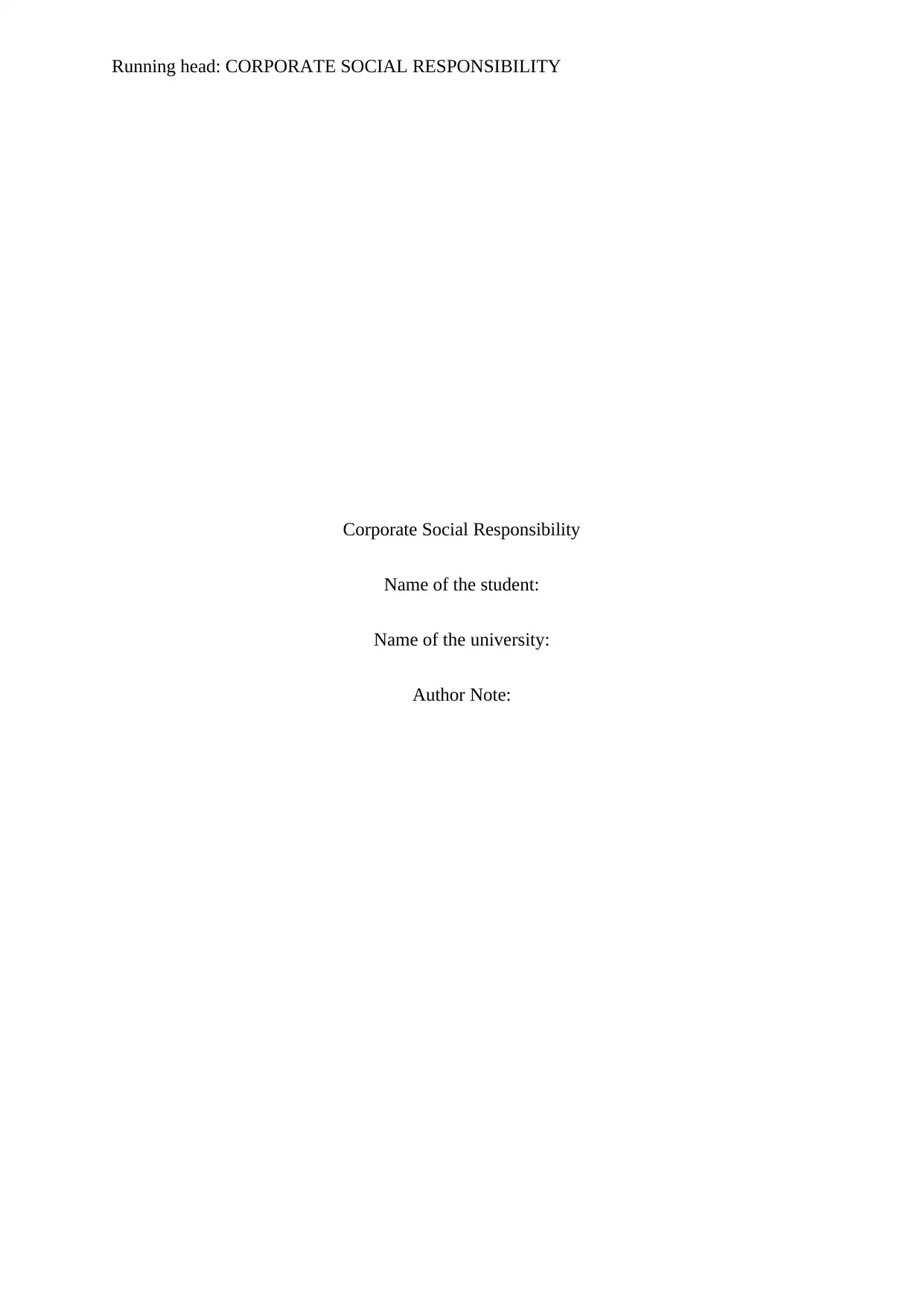
Running head: CORPORATE SOCIAL RESPONSIBILITY
Corporate Social Responsibility
Name of the student:
Name of the university:
Author Note:
Corporate Social Responsibility
Name of the student:
Name of the university:
Author Note:
Paraphrase This Document
Need a fresh take? Get an instant paraphrase of this document with our AI Paraphraser
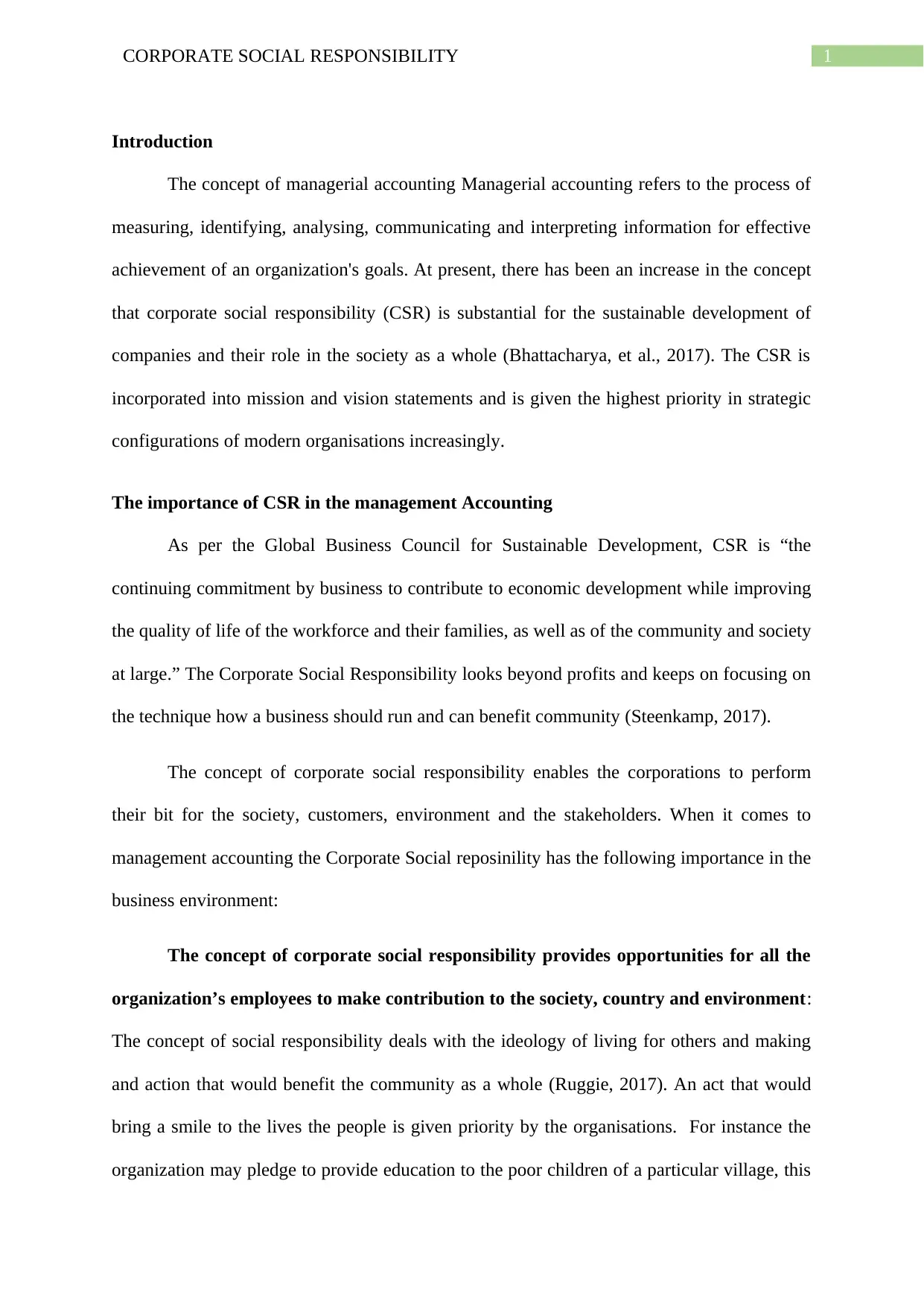
1CORPORATE SOCIAL RESPONSIBILITY
Introduction
The concept of managerial accounting Managerial accounting refers to the process of
measuring, identifying, analysing, communicating and interpreting information for effective
achievement of an organization's goals. At present, there has been an increase in the concept
that corporate social responsibility (CSR) is substantial for the sustainable development of
companies and their role in the society as a whole (Bhattacharya, et al., 2017). The CSR is
incorporated into mission and vision statements and is given the highest priority in strategic
configurations of modern organisations increasingly.
The importance of CSR in the management Accounting
As per the Global Business Council for Sustainable Development, CSR is “the
continuing commitment by business to contribute to economic development while improving
the quality of life of the workforce and their families, as well as of the community and society
at large.” The Corporate Social Responsibility looks beyond profits and keeps on focusing on
the technique how a business should run and can benefit community (Steenkamp, 2017).
The concept of corporate social responsibility enables the corporations to perform
their bit for the society, customers, environment and the stakeholders. When it comes to
management accounting the Corporate Social reposinility has the following importance in the
business environment:
The concept of corporate social responsibility provides opportunities for all the
organization’s employees to make contribution to the society, country and environment:
The concept of social responsibility deals with the ideology of living for others and making
and action that would benefit the community as a whole (Ruggie, 2017). An act that would
bring a smile to the lives the people is given priority by the organisations. For instance the
organization may pledge to provide education to the poor children of a particular village, this
Introduction
The concept of managerial accounting Managerial accounting refers to the process of
measuring, identifying, analysing, communicating and interpreting information for effective
achievement of an organization's goals. At present, there has been an increase in the concept
that corporate social responsibility (CSR) is substantial for the sustainable development of
companies and their role in the society as a whole (Bhattacharya, et al., 2017). The CSR is
incorporated into mission and vision statements and is given the highest priority in strategic
configurations of modern organisations increasingly.
The importance of CSR in the management Accounting
As per the Global Business Council for Sustainable Development, CSR is “the
continuing commitment by business to contribute to economic development while improving
the quality of life of the workforce and their families, as well as of the community and society
at large.” The Corporate Social Responsibility looks beyond profits and keeps on focusing on
the technique how a business should run and can benefit community (Steenkamp, 2017).
The concept of corporate social responsibility enables the corporations to perform
their bit for the society, customers, environment and the stakeholders. When it comes to
management accounting the Corporate Social reposinility has the following importance in the
business environment:
The concept of corporate social responsibility provides opportunities for all the
organization’s employees to make contribution to the society, country and environment:
The concept of social responsibility deals with the ideology of living for others and making
and action that would benefit the community as a whole (Ruggie, 2017). An act that would
bring a smile to the lives the people is given priority by the organisations. For instance the
organization may pledge to provide education to the poor children of a particular village, this
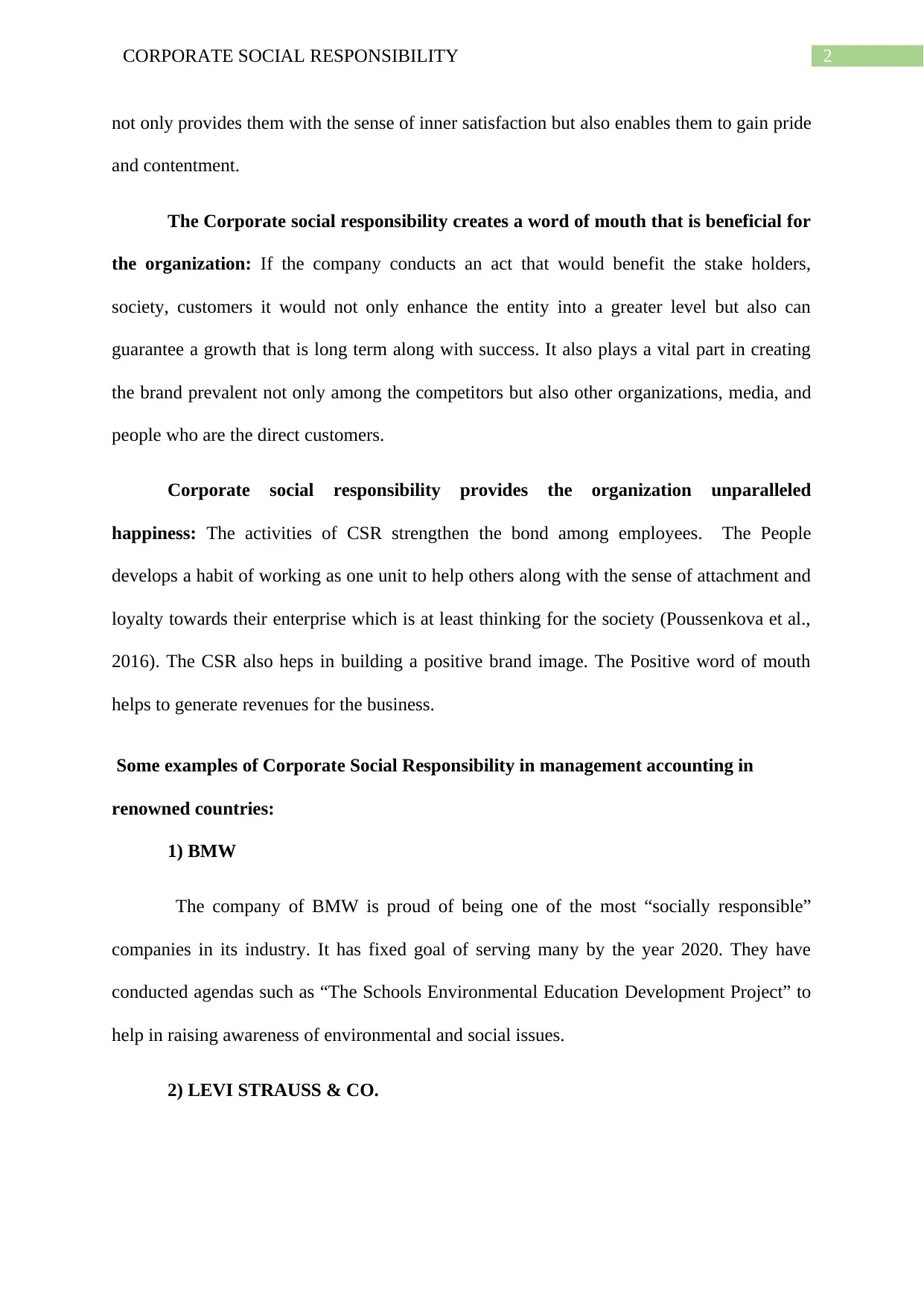
2CORPORATE SOCIAL RESPONSIBILITY
not only provides them with the sense of inner satisfaction but also enables them to gain pride
and contentment.
The Corporate social responsibility creates a word of mouth that is beneficial for
the organization: If the company conducts an act that would benefit the stake holders,
society, customers it would not only enhance the entity into a greater level but also can
guarantee a growth that is long term along with success. It also plays a vital part in creating
the brand prevalent not only among the competitors but also other organizations, media, and
people who are the direct customers.
Corporate social responsibility provides the organization unparalleled
happiness: The activities of CSR strengthen the bond among employees. The People
develops a habit of working as one unit to help others along with the sense of attachment and
loyalty towards their enterprise which is at least thinking for the society (Poussenkova et al.,
2016). The CSR also heps in building a positive brand image. The Positive word of mouth
helps to generate revenues for the business.
Some examples of Corporate Social Responsibility in management accounting in
renowned countries:
1) BMW
The company of BMW is proud of being one of the most “socially responsible”
companies in its industry. It has fixed goal of serving many by the year 2020. They have
conducted agendas such as “The Schools Environmental Education Development Project” to
help in raising awareness of environmental and social issues.
2) LEVI STRAUSS & CO.
not only provides them with the sense of inner satisfaction but also enables them to gain pride
and contentment.
The Corporate social responsibility creates a word of mouth that is beneficial for
the organization: If the company conducts an act that would benefit the stake holders,
society, customers it would not only enhance the entity into a greater level but also can
guarantee a growth that is long term along with success. It also plays a vital part in creating
the brand prevalent not only among the competitors but also other organizations, media, and
people who are the direct customers.
Corporate social responsibility provides the organization unparalleled
happiness: The activities of CSR strengthen the bond among employees. The People
develops a habit of working as one unit to help others along with the sense of attachment and
loyalty towards their enterprise which is at least thinking for the society (Poussenkova et al.,
2016). The CSR also heps in building a positive brand image. The Positive word of mouth
helps to generate revenues for the business.
Some examples of Corporate Social Responsibility in management accounting in
renowned countries:
1) BMW
The company of BMW is proud of being one of the most “socially responsible”
companies in its industry. It has fixed goal of serving many by the year 2020. They have
conducted agendas such as “The Schools Environmental Education Development Project” to
help in raising awareness of environmental and social issues.
2) LEVI STRAUSS & CO.
⊘ This is a preview!⊘
Do you want full access?
Subscribe today to unlock all pages.

Trusted by 1+ million students worldwide
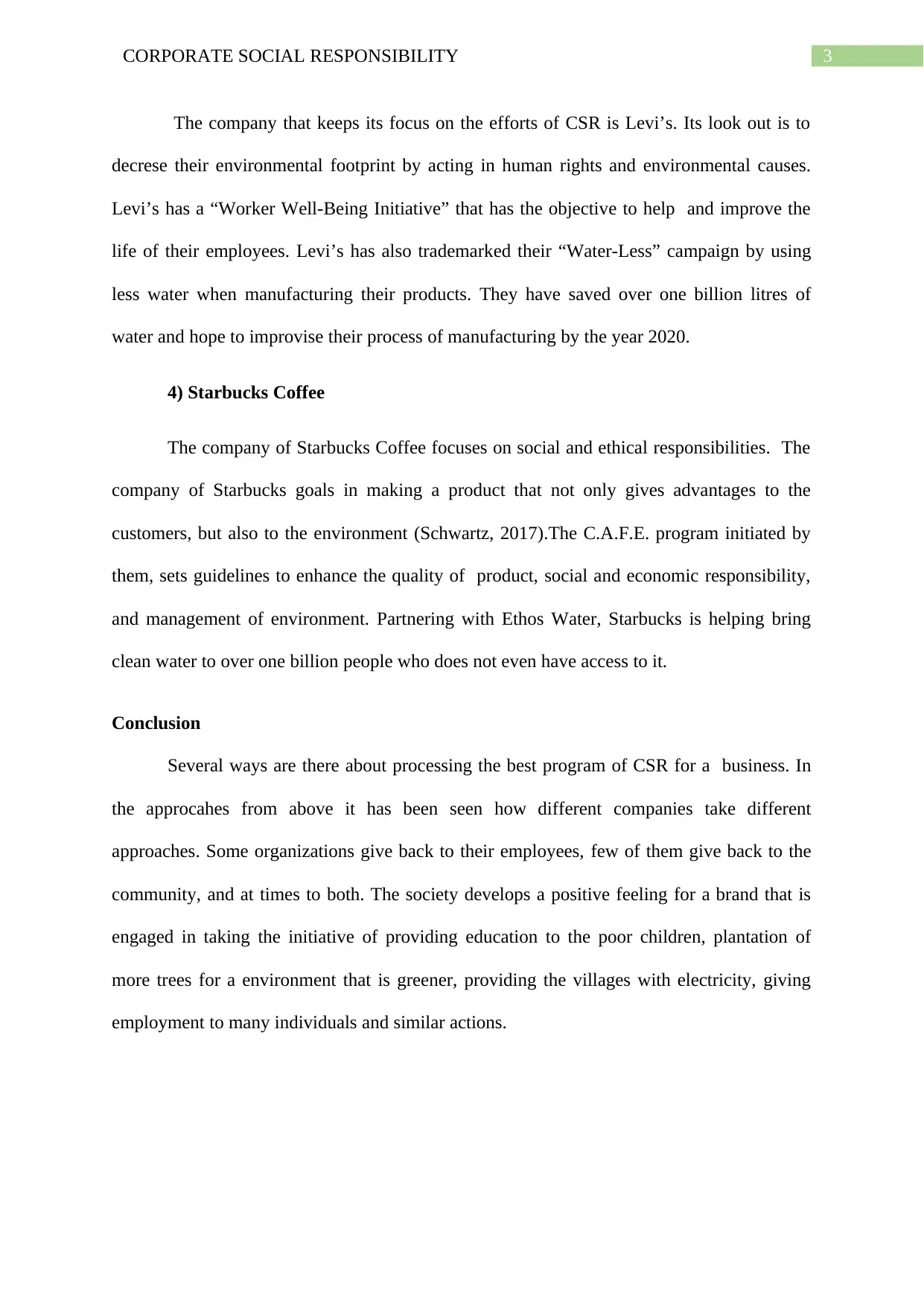
3CORPORATE SOCIAL RESPONSIBILITY
The company that keeps its focus on the efforts of CSR is Levi’s. Its look out is to
decrese their environmental footprint by acting in human rights and environmental causes.
Levi’s has a “Worker Well-Being Initiative” that has the objective to help and improve the
life of their employees. Levi’s has also trademarked their “Water-Less” campaign by using
less water when manufacturing their products. They have saved over one billion litres of
water and hope to improvise their process of manufacturing by the year 2020.
4) Starbucks Coffee
The company of Starbucks Coffee focuses on social and ethical responsibilities. The
company of Starbucks goals in making a product that not only gives advantages to the
customers, but also to the environment (Schwartz, 2017).The C.A.F.E. program initiated by
them, sets guidelines to enhance the quality of product, social and economic responsibility,
and management of environment. Partnering with Ethos Water, Starbucks is helping bring
clean water to over one billion people who does not even have access to it.
Conclusion
Several ways are there about processing the best program of CSR for a business. In
the approcahes from above it has been seen how different companies take different
approaches. Some organizations give back to their employees, few of them give back to the
community, and at times to both. The society develops a positive feeling for a brand that is
engaged in taking the initiative of providing education to the poor children, plantation of
more trees for a environment that is greener, providing the villages with electricity, giving
employment to many individuals and similar actions.
The company that keeps its focus on the efforts of CSR is Levi’s. Its look out is to
decrese their environmental footprint by acting in human rights and environmental causes.
Levi’s has a “Worker Well-Being Initiative” that has the objective to help and improve the
life of their employees. Levi’s has also trademarked their “Water-Less” campaign by using
less water when manufacturing their products. They have saved over one billion litres of
water and hope to improvise their process of manufacturing by the year 2020.
4) Starbucks Coffee
The company of Starbucks Coffee focuses on social and ethical responsibilities. The
company of Starbucks goals in making a product that not only gives advantages to the
customers, but also to the environment (Schwartz, 2017).The C.A.F.E. program initiated by
them, sets guidelines to enhance the quality of product, social and economic responsibility,
and management of environment. Partnering with Ethos Water, Starbucks is helping bring
clean water to over one billion people who does not even have access to it.
Conclusion
Several ways are there about processing the best program of CSR for a business. In
the approcahes from above it has been seen how different companies take different
approaches. Some organizations give back to their employees, few of them give back to the
community, and at times to both. The society develops a positive feeling for a brand that is
engaged in taking the initiative of providing education to the poor children, plantation of
more trees for a environment that is greener, providing the villages with electricity, giving
employment to many individuals and similar actions.
Paraphrase This Document
Need a fresh take? Get an instant paraphrase of this document with our AI Paraphraser
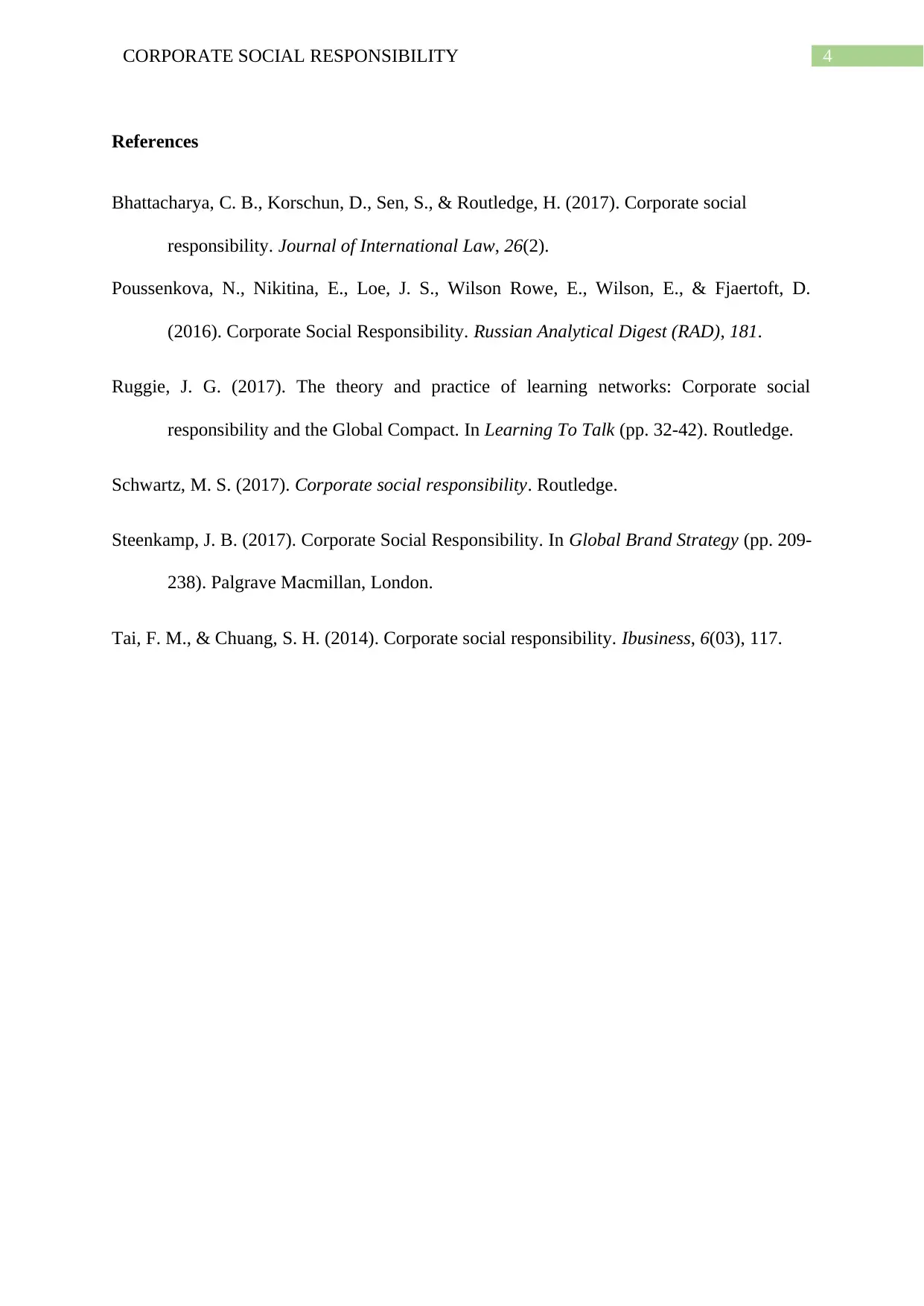
4CORPORATE SOCIAL RESPONSIBILITY
References
Bhattacharya, C. B., Korschun, D., Sen, S., & Routledge, H. (2017). Corporate social
responsibility. Journal of International Law, 26(2).
Poussenkova, N., Nikitina, E., Loe, J. S., Wilson Rowe, E., Wilson, E., & Fjaertoft, D.
(2016). Corporate Social Responsibility. Russian Analytical Digest (RAD), 181.
Ruggie, J. G. (2017). The theory and practice of learning networks: Corporate social
responsibility and the Global Compact. In Learning To Talk (pp. 32-42). Routledge.
Schwartz, M. S. (2017). Corporate social responsibility. Routledge.
Steenkamp, J. B. (2017). Corporate Social Responsibility. In Global Brand Strategy (pp. 209-
238). Palgrave Macmillan, London.
Tai, F. M., & Chuang, S. H. (2014). Corporate social responsibility. Ibusiness, 6(03), 117.
References
Bhattacharya, C. B., Korschun, D., Sen, S., & Routledge, H. (2017). Corporate social
responsibility. Journal of International Law, 26(2).
Poussenkova, N., Nikitina, E., Loe, J. S., Wilson Rowe, E., Wilson, E., & Fjaertoft, D.
(2016). Corporate Social Responsibility. Russian Analytical Digest (RAD), 181.
Ruggie, J. G. (2017). The theory and practice of learning networks: Corporate social
responsibility and the Global Compact. In Learning To Talk (pp. 32-42). Routledge.
Schwartz, M. S. (2017). Corporate social responsibility. Routledge.
Steenkamp, J. B. (2017). Corporate Social Responsibility. In Global Brand Strategy (pp. 209-
238). Palgrave Macmillan, London.
Tai, F. M., & Chuang, S. H. (2014). Corporate social responsibility. Ibusiness, 6(03), 117.
1 out of 5
Related Documents
Your All-in-One AI-Powered Toolkit for Academic Success.
+13062052269
info@desklib.com
Available 24*7 on WhatsApp / Email
![[object Object]](/_next/static/media/star-bottom.7253800d.svg)
Unlock your academic potential
Copyright © 2020–2026 A2Z Services. All Rights Reserved. Developed and managed by ZUCOL.



